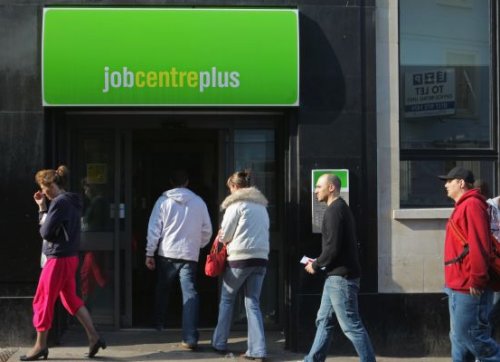Austerity economics isn’t going to work, well it is LONG term but it’s damn painful to society, but that’s what we are getting from the Conservative government, but what’s the alternative to tough government cuts and austere times?
Full employment economics in my option.
Why Government Austerity Doesn’t Work
Most economists agree economic growth is the only way out of an economic mess, so how can making more people unemployed/on welfare with less money to spend generate growth in an economy?
It can’t, less money in an economy because less of the population are in employment means lower growth which is what we are seeing now (June 2012).
Then there’s confidence in the UK economy, all this uncertainty means people with money are less likely to spend it. We want to buy another house, but really worried it could loose a lot of value over the next few years with the economic crisis developing in Europe.
I think the Tories make the mistake of comparing the UK economy to a household budget. They use the credit card analogy a fair number of times, you don’t borrow more to pay of your CC or keep spending.
Very true for personal finances, but this is an economy not a single household.
Problem with this way of thinking is unlike a household budget where you lay off your window cleaner and save exactly what it cost to clean your windows, when you make equivalent changes in an economy like lay off 10% of the public sector you still have to pay them via increased welfare benefits and lower tax receipts, but now you also have dirty windows!
I suspect whatever direct savings are made in wages are mostly lost in welfare bills and lower tax receipts, would love to know the actual figures?
Full Employment Equals Lower Welfare Payments and Higher Tax Receipts
The government should be working on a do we ACTUALLY save money laying people off policy, not we pay them £500 a week, firing them saves us £500 a week, end of austerity calculation.
If it cost £500 a week to keep a public sector worker employed, will it save money taking into account welfare payments, lost tax paid etc… If there’s no benefit firing a public sector worker because the average public sector worker when unemployed would cost the country an extra £100 a week, by firing them it’s digging a deeper hole.
That’s not to say never lay public sector workers off, if it makes sense financially taking everything into account lay them off.
I’ve not seen calculations for this sort of cost analysis, but since many public sector workers are on minimum wage or not much more and benefits for families is not much different to minimum wage + working tax credits etc… I can’t see how laying off loads of low paid public sector workers saves money???
Think about the crime associated with long term unemployment of the young, aiming for full employment should make fiscal sense.
All that being said long term austerity will work, but it will cost us a generation of young people to long term unemployment, damage the fabric of society and I strongly suspect cost a lot more than aiming for full employment on a subsidy basis (isn’t most public sector work subsidised (not making a profit)?).
David Law















“I didn’t mind paying tax but I begrudged paying tax at 40% to fund the lazy chavs and their Skysports News of the World lifestyle who lived not too far away from me.”
I agree with you 100%, some (and I don’t know the amount/percentage) of our tax money is spent on people who do not deserve it.
As I’ve mentioned before I like the concept of the work for benefits type programs: Vote No To BNP has worked in that area and thinks they are all doomed to fail, but I’m not 100% convinced.
I’d rather see government spending our money encouraging business to create more jobs (and government creating jobs in the public sector) than pay benefits to people who are capable of working to do nothing.
If the government doesn’t act we’ll have another generation of unemployable people like we had after the Conservative recessions.
We need government to set the stage so our country is more appealing to do business in/with than similar countries (it’s doing well, but it can do more). That can in some cases be achieved through tax incentives like the Canadian government does to promote it’s film industry.
It’s not rocket science, if a person is working it’s better than not working, we should be aiming for full employment using schemes that cost the country less than having millions unemployed/unemployable.
I don’t think governments (Conservative and Labour) think about this in the right way. It’s not necessarily about making a ‘profit’, it should be about costing the country as little as possible for maximum gain.
For example if it currently costs £2,000 (making the number up BTW) a month to keep a medium size family on benefits, it’s better overall if the adult(s) in the family are working and it costs £1,000 a month on less in benefits (working tax credits is an example of a successful policy). Still not ideal, but at least it costs less and the adults in the family are productive and contributing to society (paying taxes, good example for their kids etc…).
You can not run a country strictly like a business with everything having to be in profit to be worthwhile, full employment and costing the country less should be the goal. We should see ourselves in competition with other countries, not each other.
David Law
Actually David (Slap), I don’t say all the Government Back to work programmes are doomed to fail lol.
What I did say once was the BNP plan Workfare Not Welfare will fail because it’s an exact copy of the old Tory policy of the 90’s which failed to the cost of a few billion.
The current Labour Government have a good policy New Deal which has been built on and built on since 1997, however having said that the latest incarnation Flexible New Deal has actually removed a lot of the really good elements from the original New Deal programmes, they don’t invest as much money as they used to in re-training, previously the programmes had on average £10 billion a year invested and managed to reduce the unemployment level to under half of what it was in 1997.
Now that investment is around the £4 billion mark per year, the issue I have with that is at a time when the investment is really needed Labour have reduced it by more than half.
So started well with an excellent policy and are now kicking their own hard work in the nuts so to speak.
Quick more realistic calculation on average family 2 adults 2 kids on benefits David:
Couples rate: £186 every 2 weeks
1st Child extra: £40 every 2 weeks
2nd child extra: £15 every 2 weeks
Total cash benefits: £241 every 2 weeks, so £482 a month.
Average Housing Benefit: £400 per month (varies dependent on area)so what people assume people get on benefits for the average family isn;t anywhere near what people assume it is.
We all hear about the families getting loads of cash, but they are normally people who either have large families or family members with disabilities etc etc.
But the average benefit bill for a four person family is less than £1,000 per month.
I wasn’t using the £2,000 figure as an actual estimate, just for a number to work from. I assumed it would be an over estimate, but not by that much.
I was thinking three kids and if you aren’t renting a Council or Housing Association house there’s not many areas you can rent a 2 or 3 bedroom house for only £400 a month. I assume the £400 average includes single people in flats etc… so an average family would receive more than £400 a month housing benefit.
You’ve also missed Council Tax benefit, free prescription, free school meals etc…
I was also thinking about indirect costs the government has to spend on employing people to manage benefit claims etc… (more are employed due to higher unemployment).
It all adds up, £1,500 a month doesn’t sound too far off.
Not that it matters, was just a number for my hypothetical example.
David Law
Based on UK averages as a whole for benefits (data I have access to). It’s one of the things I tend to get annoyed with the assumption that people on benefits get £1000’s when the reality isn’t actually the case.
Most councils have a cap on how much Housing Benefit they pay as well, so lots of people have to pay the extra out of their other benefits which puts an extra squeeze on some families.
In terms of the % of your tax money that goes to paying benefits in real terms it isn’t that much, the average person (family) gets benefits for 7-8 months at anyone time, so not much of your Income Tax goes towards other peoples benefits.
Where the majority of money for benefits goes is to people on disability allowances and benefits, the majority of people claiming JSA are between 18-24 still living at home and get £56 (ish) per week, with no entitlement to other benefits only Prescriptions.
I have spent most of my working life working with people on benefits and do get frustrated with the assumptions people tend to make about the benefit system. I know that wasn’t your intention so sorry if I sounded as though I had an attitude about the subject :)
No problem, don’t forget I’m one of the people who has spent time on benefits for medical reasons, it took a couple of years after leaving University to come to the hard fact I wasn’t going to be able to go back to University to finish my degree and continue with my career plans.
My plan was to leave Uni for a year, get my back fixed and go back to finish my degree… Two years later my back was worse and there was no way I could work a 9-5 job! I had a choice of living on benefits probably until I died! or go self employed and learn new skills to provide for my family.
So I know the vast majority of those who are in need (like we were) are not trying to milk the system and want to get on in life under difficult circumstances. What I want to see is more help for people like me who want to get on, but for whatever reason are having problems.
It’s not easy living on benefits, but then it’s not meant to be easy living on benefits. Whether it’s medical reasons like it was for me or hard economic times for many now, I can not believe families with both adults unemployed who care about their kids that neither of the adults want to work. Of course there’s a small minority who do take full advantage of the system, but they are a minority and it’s the majority of hard working people that the welfare system is there to help in times of need.
When I decided to go self employed I didn’t think to ask for help, so I don’t personally know how good/bad the system is for people who want to get off benefits via self employment. I wrote an article about going self employed and working tax credit and a commenter (Charlotte) said she was fobbed off when she asked about going self employed.
During Job Center type interviews unemployed people should be encouraged to look into starting their own business and explained how working tax credits work, it’s got to be better for the country to support potential new entrepreneurs than paying benefits for people to do nothing.
Do you know the money your hypothetical average family (2 adults, 2 kids) would receive if one of the adults started a business and in the first year earned £500 working full time?
There’s a working tax benefits calculator at I plugged in 2 adults, 2 kids, one adult employed earning £500 a year and no to most question (no disability, no child care costs) and the figure came out as £795.00 a month (£182.96 a week) with over half related to the kids. Add to that housing and council tax benefit and it’s £1,300+ a month.
That sounds comparable to unemployment type benefits.
My first 6 months self employed I made a ~£500 loss (cost of a PC), so survived completely on the equivalent of working tax credit (first full year, April to March, made a good profit).
David Law
You would be talking tax credits in that instance, you would have to be working a minimum of 30 hrs per week and earning minimum wage (that’s all you have to declare at least) then the you’d get the basic element of around £85 pw (for the couple) plus child elements depending on age etc, so I would hazard a guess as Tax Credits isn’t a specialist area of mine but in the region of £200 pw, plus of course then you can add Council Tax and Housing Benefit to that (based on one working 2 kids I would suggest full entitlement to both)
The is a specific programme for people who want to start their own businesses New Deal Self Employment (restricted access) you need to have damn good ideas n now due to the serious budget cuts in the programme, most Jobcentres don’t even advertise the programme anymore.
The Labour Government even introduced a New Deal for Musicians programme for people who wanted to get into the music industry, most people would probably be surprised at the range of New Deal programmes on offer:
1. New Neal 18-24
2. New Deal 25+
3. New Deal for Partners
4. New Deal 50+
5. New Deal Lone Parents
6. New Deal Self Employment
7. New Deal for Musicians
And employers can claim anything upto £2,500 for taking on someone between 18 & 24 and £1,500 for taking on someone over 25.
People over 50 get an extra £50 pw for six months when they start work as well as the employer getting a few quid as well.
New Deal Self Employment used to have start up grants of upto £2,500.
For 18-24 year olds the Government pay upto £3,000 for training courses in just about any area not restricted like the Tories used to do to standard stuff.
So Labour had a fantastic programme of New Deal’s I was involved in the designed of the programmes between 1996 and 1999
I’ve only had a quick skim read through some of the New Deal information, but looks really good on first reading.
Apparently you can test out self employment under the New Deal Self Employment scheme for up to 26 weeks which is a great idea.
I had no idea Labour had put so much effort into these types of schemes.
Do you know if they are working at all?
My only problem with New Deal type schemes (not including the New Deal Self Employment, that’s definitely got the potential of creating new jobs) is they might not be doing enough to encourage more job creation in Britain.
If it (or other government initiatives) doesn’t encourage the creation of new jobs, all schemes like these do is help unemployed people find a job that would have been filled by someone else anyway. Nothing wrong with that per se.
To go to an extreme, if we had say 5 million job vacancies there would be no need for schemes like these since there would be a surplus of jobs available: the unemployed wouldn’t be fighting over jobs, employees would be fighting over potential employees.
What can the government do to encourage more job creation?
New Deal Self Employment for example is encouraging individuals to create their own jobs and that’s good for the country.
The vast majority of my income comes from working with foreign businesses (US mostly), so I’m taking work away from Americans and bringing US$s into Britain, though the US businesses I work with make more money because of my advice as well (I rarely work with UK businesses!).
David Law
In the early days of the programme 1997 to 2002 the New Deal programmes actively promoted job creation because they had the massive budgets to do so.
Since 2002 they have scaled back on the funding partly because of the success of the programmes, but since the start of the recession that investment hasn’t gone up again to compensate for the number of new claimants which is where the problem is.
The Government where excellent in terms of investment in the early days but now when that investment is really needed again it just isn’t happening, which is one of the reasons I have gone off the Labour Gov knowing all the investment and hard work that went in to getting the unemployment lists down when it mattered this time round when it matters again they don’t seem to care about the programmes.
The most interesting part of all this is that the main ideas for New Deal came from Gordon Brown as chancellor but now he’s PM he doesn’t seem to want to keep the good work going that he really pushed for in the first place.
I agree with what you have written here but I would say that you don’t have to run the country strictly like a business only more like a business rather than a charity basket case!